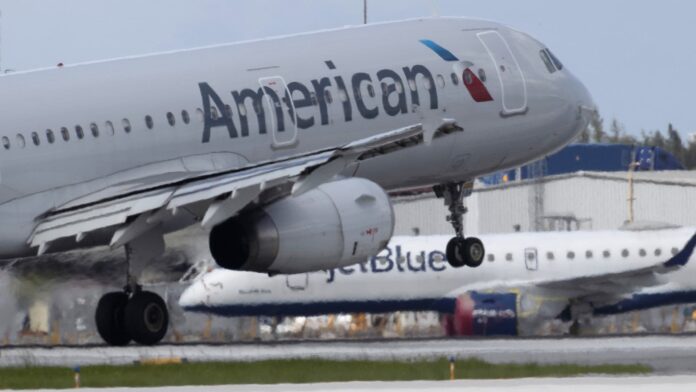An American Airlines plane lands on a runway near a parked JetBlue plane at the Fort Lauderdale-Hollywood International Airport on July 16, 2020 in Fort Lauderdale, Florida.
Joe Raedle | Getty Images
The Justice Department heads to court in Boston on Tuesday in hopes of undoing a year-and-a-half-old pact between American Airlines and JetBlue Airways in the Northeast U.S.
The carriers argue the deal allows them to better compete against larger airlines. But the Biden administration argues the agreement is effectively a merger that will drive up fares. Last September, the Justice Department along with the attorneys general of six states and the District of Columbia sued to block the partnership, which was approved in the final days of the Trump administration.
The antitrust trial will be a test for President Joe Biden’s Justice Department, which has been tasked with taking a hard stance against threats to competition.
However, the antitrust push has run into obstacles. Earlier this month, a federal judge denied the Justice Department’s bid to block UnitedHealth‘s acquisition of Change Healthcare. Last week, another federal judge rejected the Justice Department’s bid to stop a merger between two major U.S. sugar refiners.
The trial against the airline alliance comes as JetBlue is in the process of trying to acquire discount carrier Spirit Airlines for $3.8 billion to create the country’s fifth-largest airline, a deal that faces a high hurdle with regulators, though that deal isn’t a part of the lawsuit.
JetBlue, a quirky New York-based airline, identifies as a low-cost carrier but also offers high-end products like its premium Mint class, and last year launched flights to London from New York and Boston. The carrier has turned to partnerships and now a potential acquisition to grow.
“I think what we’ve seen through this and through the Spirit merger is management believes they have a challenge to scale growth and they view the pace of organic growth as too slow,” said Samuel Engel, an aviation analyst at consulting firm ICF.
The airlines’ Northeast Alliance allows them to share revenue, coordinate routes and sell seats on each other’s planes, which the airlines say help them better compete against rivals United Airlines and Delta Air Lines in the congested airspace in and around New York City and Boston.
American and JetBlue have about a 31% combined share of the departing seats from the major airports serving New York City, while United has 24% and Delta has 22%, according to ICF data. In Boston, the carriers under the NEA have a 45% combined share of departing seats over Delta’s 24% and United’s 8%.
The alliance “will eliminate significant competition between American and JetBlue that has led to lower fares and higher quality service for consumers traveling to and from those airports,” the Justice Department’s suit alleges. “It will also closely tie JetBlue’s fate to that of American, diminishing JetBlue’s incentives to compete with American in markets across the country.”
American and JetBlue, in a pretrial brief filed on Saturday, said there is no evidence that consumers have been harmed by the alliance and that it allows them to expand in capacity-constrained airports where they wouldn’t be able to on their own.
Witnesses are expected to include the airlines’ top executives, including JetBlue’s CEO Robin Hayes, the first witness scheduled for Tuesday. Other airlines’ executives could also testify.
The trial begins as Biden and other administration officials are taking a hard line against airline performance following an increase in cancellation and delay rates during the summer.
On Monday, Biden announced a proposal for a new rule to require airlines and online travel agencies to provide passengers with fee information for add-ons like seat selection at the time they are searching for fares. In the summer, the Transportation Department proposed stricter rules for passenger refunds when flights are canceled or delayed.
“No one’s ever lost votes for being critical of airlines,” said Matt Colbert, who previously managed operations and strategies at several U.S. carriers and is the founder of consulting firm Empire Aviation Services.


